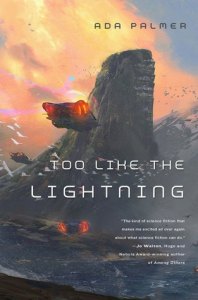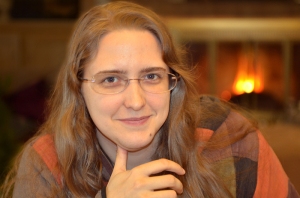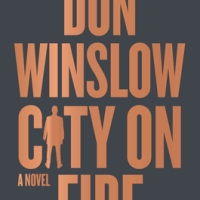Guest Post: “In Terra Ignota, Diaspora Becomes Nations Without Borders” by Ada Palmer
 In case you missed it, yesterday I posted my review of the novel Too Like the Lightning, sharing my thoughts on this extraordinary book which takes place in a futuristic world very different from the one we live in right now. That’s why we’re absolutely thrilled and honored to welcome author Ada Palmer to The BiblioSanctum today, to tell us a bit about her inspiration for the book and how her own experiences studying in Italy have shaped the political and geographic philosophy of her Terra Ignota series. As someone who grew up with expatriate parents and holds multiple passports myself, I found Ada’s post utterly fascinating, and I hope you will enjoy it as much as I did!
In case you missed it, yesterday I posted my review of the novel Too Like the Lightning, sharing my thoughts on this extraordinary book which takes place in a futuristic world very different from the one we live in right now. That’s why we’re absolutely thrilled and honored to welcome author Ada Palmer to The BiblioSanctum today, to tell us a bit about her inspiration for the book and how her own experiences studying in Italy have shaped the political and geographic philosophy of her Terra Ignota series. As someone who grew up with expatriate parents and holds multiple passports myself, I found Ada’s post utterly fascinating, and I hope you will enjoy it as much as I did!
![]()
IN TERRA IGNOTA, DIASPORA BECOMES NATIONS WITHOUT BORDERS
by Ada Palmer
In Terra Ignota I imagine a future Earth united by a transportation system so quick you can get from anywhere on Earth to anywhere else on Earth in two hours. As a result, the whole world is within commuting distance, like a city and its suburbs, so it’s perfectly practical to live in Honolulu, work in Tokyo and lunch in Paris while a spouse works in Buenos Aires and lunches in Mumbai. The immediate result of such a technology might be something like a world of expats, where every house on a block might contain citizens of a different nation, and no child grows up without friends from many other ethnic and linguistic groups living and playing on the same block. In such a future, geography would rapidly cease to makes sense as the political or cultural unit, since the community of people you share a culture with is inevitably diasporic, people united by language, background, hobbies, interests, work, school rather than centered in the place where you happened to be born, or buy real estate. Politics would have to adapt to draw lines between peoples in some other way than on a map.
I started thinking about this question during the years I spent living in Florence and Rome at academic research institutes. These places have scholars from a dozen countries, with families and kids, living together as a community nowhere near anyone’s home nation. Local city regulations governed our daily activities, but every day I sat down to dinner with people remotely governed by ten different governments and ten different sets of laws, all mixing effortlessly. I watched kids who spoke a dozen languages playing together, rapidly creating their own unique language as they taught each other the most useful phrases from their own. I talked with families where the father might be Spanish, the mother Australian, with kids born in France and growing up in Italy, kids for whom nationality had nothing to do with the spot where they were born, and everything to do with which of many cultures they felt connected to. Such a child’s community was partly at school, partly at the institute, partly online, friends from past homes on the far side of the world, or friends they’d only met online—a universal phenomenon for children of the internet age. I listened to parents talking about such kids growing up and having to choose which passport to get, which nation to be governed by. Sitting at those tables made me think how irrelevant it was in many ways that all our citizenships corresponded to blotches of territory on a map. In that moment citizenship wasn’t about geography, it was about identity, language, law, what power you would appeal to in a crisis, and which government your absentee ballot had a say in.
This gave me my idea for non-geographic nations, a future where international travel and marriage would become more common—as they already are in the European Union—until living in the place that corresponds to your government becomes the exception instead of the rule. Why, then, have geography be part of citizenship at all? I don’t mean the end of all the nations that exist now, but what if being Italian, or South African, or Japanese meant identity, a choice, what government you love, respect, and choose to be a part of, instead of where you live? What if the diasporic global populations that consider themselves Chinese or Greek or Igbo came to be what those nations really meant, instead of places? Parents with kids born with four different potential claims to citizenship would talk about their children growing up and choosing for themselves which one(s) to keep, thinking about which identities they shared, and which laws they most wanted to be governed by. In such a world, nations might have no geography at all. City and regional ordinances could be the only geographic law, and people could choose a government when they grow up, and by governed by it no matter where they live. There is no reason you can’t have people governed by different laws living side-by-side; it happens today all the time as people travel. In fact, throughout Earth history there have been countries with multiple law overlapping in the same place, like how Europe had Church Law alongside lay laws, so two siblings one of whom was a monk and the other a carpenter would be governed by entirely different laws, courts and so on. It worked for centuries with no more hiccups than any modern legal system has.
And if citizenship were part of coming-of-age instead of being dropped on you by chance of birth, then governments would have to compete for citizens, working to represent ideals and traditions people would be proud to choose to be part of. Nationalism, language, religion, and race as well as political opinions would now affect people’s citizenship directly, so young people might grow up and have to choose which was more important to them, a government which reflected their native races/languages or their favorite political ideals. An unpopular or unsuccessful government would be chosen by fewer citizens, and have a strong incentive to redefine itself, and a very unpopular regime might see citizens leave en masse, since it’s a lot easier to change citizenship when it doesn’t mean leaving your home, city and job as well.
All this feels like a big change, but it’s just a continuation of what’s already happening as transportation gets faster, and as it becomes more common to move to a new city for work or school. More and more people now live far from where we were born, and have our most important relationships with people far from where we live. The European Union is giving us an example of how a multi-state arbiter lubricating the interactions between multiple governments can make multinational lives and families easier. Terra Ignota imagines the small step from “easier” to “normal.”
![]()
Ada Palmer is a professor in the history department of the University of Chicago, specializing in Renaissance history and the history of ideas. Her first nonfiction book, Reading Lucretius in the Renaissance, was published in 2014 by Harvard University Press. She is also a composer of folk and Renaissance-tinged a capella music, most of which she performs with the group Sassafrass. Her personal site is at adapalmer.com, and she writes about history for a popular audience at exurbe.com and about SF and fantasy-related matters at Tor.com.














It sure would make travel easier, though a 2 hour commute to work would not be for me 😉
LikeLike
I’d probably get a lot of reading/audio listening done though 🙂
LikeLike
That was really interesting! This whole idea was one of the thing that facinated me the most in Too Like The Lightning! 😀 (It actually made me want to reread the book haha, I want the sequel!)
LikeLike
Isn’t it fascinating? I for one would welcome any kind of technology that would enable us to travel from one end of the world to the other in a matter of hours. If it would decrease the amount of time having to sit in a cramped seat on a plane, I am all for it 😀
LikeLiked by 1 person
What an interesting concept – the idea of everywhere being so easy to get to. Last week we went for a short break to Cornwall (we live in the North so this was like a 5 hour journey), whereas to fly to Amsterdam or Paris only takes 45 minutes or 1.15 respectively. Lets keep our fingers crossed for improving transportation eh! Very interesting.
Lynn 😀
LikeLike
I’ve always envied Europeans that luxury of living in close proximity to so many different countries, no matter where you are, and you guys have an amazing railway system too! I hate to fly so I avoid it if possible, if only getting around the US was as simple as jumping on a train, but our rail system is pathetic in comparison 🙂
LikeLike
In this particular historical moment, when a few angry voices keep clamoring for borders and walls, it’s so very refreshing to hear such concepts as a world where those limitations have no meaning anymore…
LikeLike
So true!
LikeLike
This is such a fascinating idea, and perfect for people who love to travel, right? I’ve always loved the idea of “belonging” to a community that you feel connected to, without having to worry about your race or nationality. Sounds like a great future:-D
LikeLike
If traveling were this easy, I know I’d do a lot more of it 🙂
LikeLike
Pingback: Weekend Links: May 14, 2016 | SF Bluestocking
Pingback: On sale now: Ada Palmer’s debut novel Too Like the Lightning – My WordPress Site